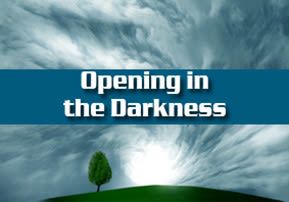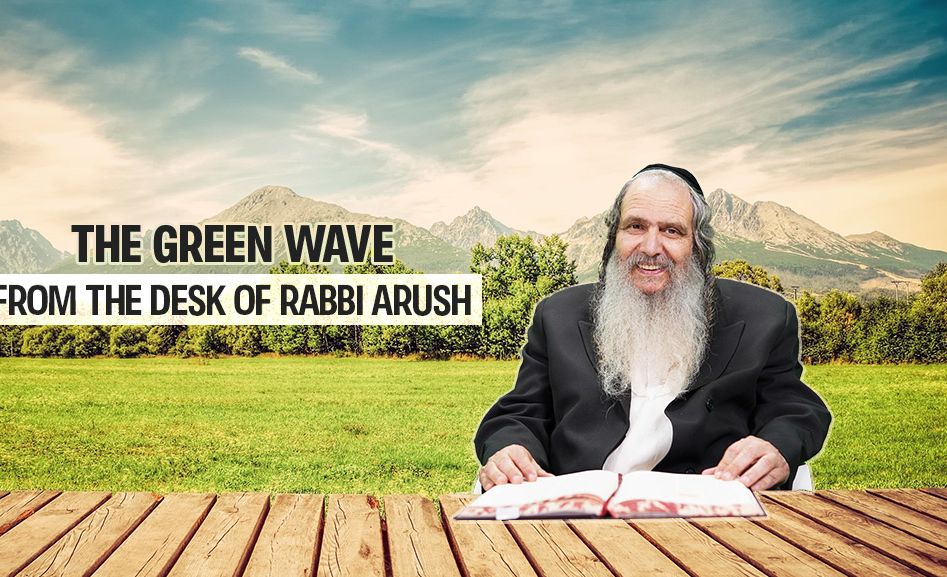
Opening in the Darkness
Some people make the mistake of persecuting themselves and blaming themselves for their troubles even during personal prayer sessions; that’s not being with Hashem…

Translated by Rabbi Lazer Brody
In Forest Fields, Part 30
People chase after leading rabbis and tzaddikim in search of blessings. They don’t realize that all the blessings of all the generation’s tzaddikim are not as effective as a person’s heartfelt prayers for himself. Once a person begins to pray for himself, he opens the gate of salvation.
People ask, “How can my prayers be stronger than the prayers of the great tzaddikim in this generation?” The answer is surprisingly simple: the prayers of the tzaddikim don’t bring a person close to Hashem as his or her own prayers do. Getting to know Hashem and coming close to Him are our task on earth. By doing what we’re supposed to do, we see blessings in whatever we do.
Getting to know Hashem means becoming familiar with Hashem’s indescribable mercy. Only those who pray attain this priceless familiarity with Hashem’s mercy.
What’s going on with me?
We all have ups and downs. During “down” periods, people have a tendency to persecute themselves when they see the emotional and spiritual darkness that seems to envelop them. They lose faith in themselves and gradually lose faith in prayer and in Hashem, G-d forbid, until they completely fall by the wayside.
A lack of spiritual arousal means that some type of severe judgment is hovering over a person and is blocking the Divine illumination from reaching that person. That’s where the feeling of darkness comes from.
If a person is weak in emuna and weak in the cognizance that there is no one but Hashem, then he attributes his lack of spiritual arousal to himself rather than to Hashem. If he’d only open his mouth and cry out to Hashem, he could pierce the darkness. Hashem is more than ready to help a person make teshuva, mitigate harsh judgments, and escape from the darkness.
In light of the above concepts, it’s readily understandable how many people returned to Hashem after a difficult challenge or tribulation. People’s suffering served to atone for their sins, mitigated harsh judgments, and brought them to subjugate their ego to Hashem to the point where Hashem’s Divine light illuminated their souls giving them a prodigious desire to come home to Hashem and to their roots. Once a soul becomes a suitable receptacle for Divine light, the person tastes the sublime sweetness of Hashem’s presence and returns to Hashem with all his heart.
Each of us should therefore do our utmost to invoke Divine mercy, and to mitigate the collective stern judgments against our people as a whole in addition to our personal stern judgments. The collective stern judgments block Divine illumination from the soul of the nation and thereby delay the Geula, the full redemption of our people. Apathy toward the prospects of Geula and the coming of Moshiach can also be traced to outstanding stern judgments that block Divine light. Without Divine light, people are cold and dark; they lack a yearning for Hashem and therefore make no progress in accomplishing the very mission that their souls were sent here for in the first place.
Many fool themselves and think that they don’t make teshuva because of their desire to live a “free” lifestyle; they’re mistaken. They don’t make teshuva because they don’t have the merit. A cloud of stern judgment hovers above them like an iron curtain that blocks Divine light. One needs Divine light to declare a fresh start and to make teshuva daily as the Torah requires. A person that doesn’t yearn for Hashem won’t have the necessary spiritual visa that will enable him to enter the portals of teshuva.
True freedom
A lack of desire for teshuva is therefore not the sign of a blessing or of a person’s free choice – the opposite holds true. Any person – nonreligious, religious, Chassidic, or whatever – that lacks a yearning for Hashem, for teshuva, and for prayer won’t feel any spiritual arousal unless he first mitigates whatever stern judgments there might be against him.
We now begin to grasp the significance of hitbodedut, personal prayer. Nothing mitigates stern judgments like personal prayer. During personal prayer, we express our desires and yearning to get close to Hashem – this in itself pierces the spiritual darkness and invokes Divine compassion that serves to mitigate stern judgments.
Some people make the mistake of persecuting themselves and blaming themselves for their troubles even during personal prayer sessions; that’s not being with Hashem. Talking to Hashem means that we cast ourselves on Hashem’s infinite mercy. We ask Hashem to illuminate our lives and our souls, and to bring us close to Him. Our appeal to Hashem should be like the appeal of a baby or toddler to a loving parent. Prayers that invoke Divine mercy are the same  prayers that trigger spiritual arousal and enthusiasm for the service of Hashem.
prayers that trigger spiritual arousal and enthusiasm for the service of Hashem.
 prayers that trigger spiritual arousal and enthusiasm for the service of Hashem.
prayers that trigger spiritual arousal and enthusiasm for the service of Hashem.Don’t be discouraged if you feel far away from Hashem or if you feel like a dried-up log on a spiritual level. Nothing’s inherently wrong with you. We all make mistakes from time to time that invoke stern judgments. So, rather than persecuting ourselves, we simply have to turn to Hashem and seek His assistance in helping us do teshuva and to remove whatever obstacles that are obstructing Hashem’s Divine light from reaching our souls. With such simple, sincere, and straightforward personal prayer that purely and innocently appeals to Hashem’s infinite mercy, there’s no such thing as despair in the world. Ultimately, Hashem will send us an opening in the darkness and illuminate our lives.
To be continued.













Tell us what you think!
Thank you for your comment!
It will be published after approval by the Editor.